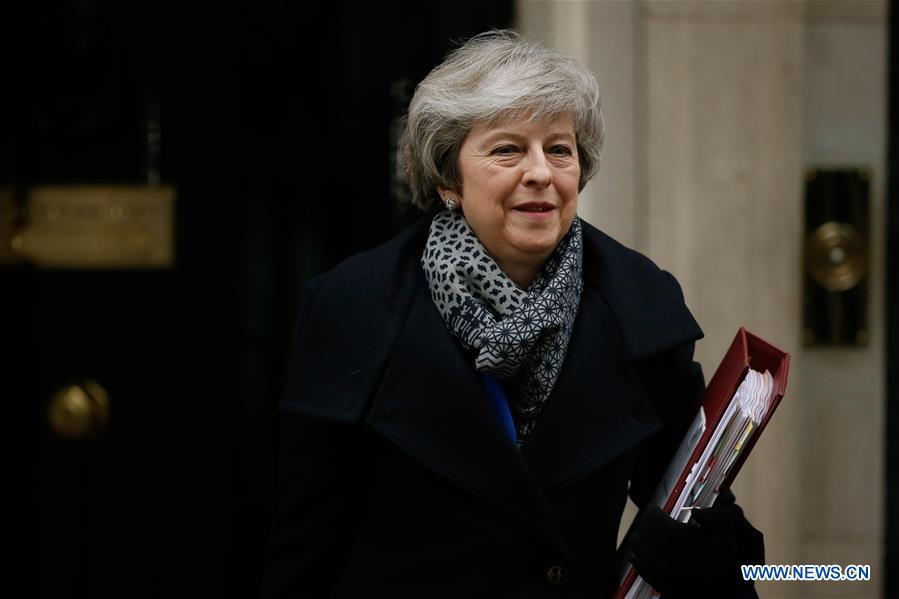
British Prime Minister Theresa May leaves 10 Downing Street for the House of Commons in London, capital of Britain, Jan. 16, 2019. (Xinhua/Tim Ireland)
LONDON, Jan. 16 (Xinhua) -- British Prime Minister Theresa May won a vital confidence vote in the House of Commons Wednesday, averting a snap general election that could have ushered in a Labour government.
After seeing off a challenge that would have triggered a battle for control of Downing Street, May announced she would be having immediate talks with leaders of opposition parties to thrash out a new Brexit deal.
Seconds after Speaker John Bercow announced the result -- 325 in favor of the government and 306 against -- May said she intended to start those talks "this evening".
May said she would continue to work to deliver on the solemn promise to the people of Britain to deliver on the result of the 2016 referendum and leave the European Union.
Urging other party leaders to approach the talks with a constructive spirit, May said: "We must find solutions that are negotiable and command sufficient support in this House (of Commons)."
Main opposition Labour leader Jeremy Corbyn called on May to rule out "once and for all" a no-deal prospects before any positive discussions took place with party leaders.
Media outlets in London quoted Downing Street confirming May will not take no-deal off the table ahead of talks with Corbyn, creating a potential deadlock in Brexit negotiations.
May's spokesperson said leaders of Labour, the Liberal Democrats, the SNP and the Welsh party, Plaid Cymru, were invited to meet the prime minister later Wednesday evening.
Corbyn and his Labour party came under criticism for refusing to take part in talks with May until their demand was met.
A spokesman for Corbyn said: "There can't be meaningful talks about how to find a deal that reflects the majority in Parliament and that can command a majority in Parliament while the threat of no deal, which would be disastrous for the country is still on the table. That must come off the table."
London mayor Sadiq Khan called Wednesday night on May's government to withdraw article 50, the mechanism that triggers Britain's EU departure on March 29.
He said: "If we cannot have a general election the British public must have the final say, with the option to stay in the EU."
In another day of nail-biting drama in the House of Commons, the 10 MPs from the Democratic Unionist Party (DUP) of Northern Ireland came to the rescue to save May's Conservative government.
The DUP has a pact to shore up May's minority government in a supply and confidence agreement.
Had the DUP back the no confidence measure put forward by Corbyn and the other political parties at Westminster, May could have lost by just one vote.
In Wednesday night's six-hour debate, politicians on the Conservative benches, who 24 hours earlier were divided on May's Brexit deal, rallied to ensure May's government survived.
Corbyn had urged MPs to back a no confidence move, saying May's zombie administration had lost the right to govern.
Professor Richard Toye, head of history at the University of Exeter said Wednesday: "It is incredibly difficult for an opposition to force a general election. The outcome of the confidence vote will be to sustain Theresa May in office but not in power. We are in the rearranging-the-deckchairs-on-the-deck-of-the-Titanic phase."
May is now on course to continue seeking parliamentary backing for a Brexit deal to enable Britain to leave the EU later this year.
May will return to the House of Commons on Monday to make a statement to MPs about Brexit and to present MPs with an alternative Brexit plan in the hope it has more success than the deal rejected Tuesday by a massive margin of MPs.











